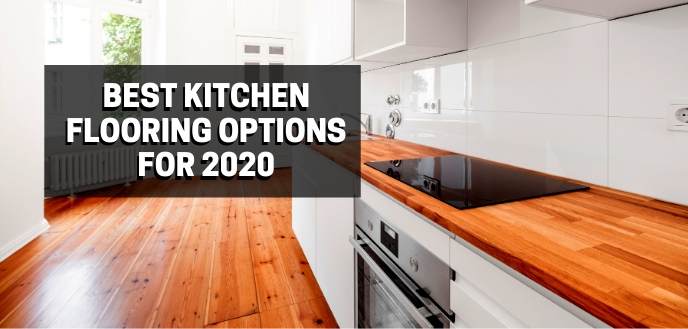Kitchen / February 18, 2020

One of the most important and long-lasting choices you’ll make while remodeling your kitchen is the flooring. But which kitchen flooring option is best for your home?
While a remodeling services company will be able to help you better understand which materials will work best in your kitchen, here are a few choices (and tips) to consider ahead of time:
Simply put, hardwood floors are gorgeous. While a more expensive option, hardwood floors add a lot of style to your kitchen. Just be sure to choose a hardwood flooring option that is hard enough to withstand heavy foot traffic. You’ll also want to make sure your hardwood is properly sealed and finished by a remodeling expert to protect it from spills.
Oak and maple are affordable, durable hardwood flooring options for the kitchen. They are considered hardwoods, as opposed to softwoods like cedar, pine and spruce.
Softwoods tend to dent more easily, are more susceptible to scuffs, scrapes and moisture than hardwoods, and are not ideal in high-traffic areas like the kitchen.
Average Lifespan: 50 to 100 years, with refinishing every 10 years or so (solid hardwood)
Average Cost: $3 – $10 per square foot (oak and maple)
The word might trigger memories of your parents’ kitchen, but the truth is linoleum has come a long way in the last century. Though it fell out of favor in the 1950s, linoleum has recently become popular again due to its eco-friendly manufacturing materials: solidified linseed oil, pine resin, cork dust, wood flour and natural mineral fillers.
It comes in three different styles – sheets, tiles and planks (or panels) – and is incredibly durable and easy to clean. In fact, linoleum has naturally antibacterial properties, making it a great option for the budget-conscious-yet-germ-averse homeowner.
Linoleum is very durable, but if you’re worried about scratches showing over the years, choose a linoleum with a varied color pattern for your kitchen flooring; this will hide flaws more effectively than solid colors.
As for the style, linoleum sheets are the most popular option due to the number of color choices available, but tiles and planks are fine options for the kitchen as well.
If you’re not a fan of the noise linoleum makes when walked on, you may want to choose cork-backed floating linoleum planks to soften sounds while you’re hustling around your kitchen.
Average Lifespan: 20 to 40 years
Average Cost: $5 – $7 for sheets or planks; $3 – $5 for tiles
Porcelain or ceramic tile is a solid, stylish and sturdy flooring option that can stand up to the messes and tests of almost any kitchen. They’ll stay cool in the summer and warm in the winter, making your kitchen a more comfortable space to cook year round.
Tile’s durability is often classed using the Porcelain Enamel Institute (PEI) abrasion test. There are 5 groups of tile – the higher the number, the higher the tile’s durability.
For kitchen flooring, you’ll want to choose a tile that is either PEI-3 or PEI 4-rated. PEI 5-rated tile is the hardest, but typically only used in industrial settings.
Average Lifespan: 75 to 100 years
Average Cost: $7 – $20 per square foot
Did You Know?
While DIY-ing flooring installs has become popular, you can actually void your flooring material’s warranty with an improper installation, meaning you’ll have to re-purchase all your flooring material and start from scratch.
When hiring kitchen remodeling services, make sure to contact an expert flooring professional to handle your installation.
In many ways, vinyl is one of the top price performers when it comes to kitchen flooring.
It is affordable to buy and less labor-intensive for a flooring expert to install. It’s fairly durable and is 100% waterproof, making it ideal for kitchens with lots of spills (read: lots of little ones).
Plus, certain luxury vinyl types can mimic more expensive flooring options like hardwood or ceramic tile, adding a lot of style for less of your budget.
Like linoleum, vinyl is a resilient flooring type, which means it is softer than non-resilient types like hardwood or tile. Because of this, you’ll want to choose a rigid core vinyl for your kitchen flooring. Rigid core vinyl has a sturdy, firm center that will stand up to heavy wear and tear over the years.
Average Lifespan: 10 to 20 years
Average Cost: $2.50 – $5 per square foot
Laminate is very similar to vinyl in look, price and installation type. Both are installed usually via click-lock planks and are similarly durable against foot traffic, and though vinyl is 100% waterproof, laminate is water-resistant enough to withstand spills in the kitchen. And like vinyl, laminate can even mimic the look of real hardwood with its photo-realistic top layers.
So what’s the big difference? The feel – laminate is made of 99% wood products (particle board), giving it a sturdier, warmer feel underfoot than vinyl, for a fraction of the price of real hardwood.
Most laminates are fairly similar, but when installing laminate, you can choose to use a premium underlayment to provide a sound barrier between floors, and make your laminate sound more like hardwood when walked on.
Average Lifespan: 15 to 25 years
Average Cost: $3 – $8 per square foot
Whatever options you’re considering for your kitchen floor, Handyman Connection is happy to help. We offer various flooring and remodeling services for just about every room in the house, including kitchens, bathrooms, basements and more. Learn more about our expert home maintenance, repair and remodeling services today.